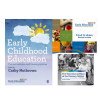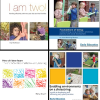Labour commits to more nursery provision in schools
On 10 June, Labour announced their plans for “over three thousand new nursery classes across England to open up access to childcare hours for families”,
The Times Education Commission has today published a report which calls for “A significant boost to early years funding targeted at the most vulnerable and a unique pupil number from birth, to level the playing field before children get to school.”
It also calls for wellbeing to be put at the heart of education and for a 15-year strategy “drawn up in consultation with business leaders, scientists, local mayors, civic leaders and cultural figures, putting education above short-term party politics and bringing out the best in our schools, colleges and universities.”
There is much to welcome in the report which takes a broad and balanced view of the role of education in society. Its chapter on Social Mobility and Levelling Up includes multiple recommendations relating to the early years:
On 10 June, Labour announced their plans for “over three thousand new nursery classes across England to open up access to childcare hours for families”,
The Conservative Manifesto has promised to extend Family Hubs to all local authorities. This would both extend funding for the 75 local authorities where they
The Lib Dems have published their manifesto, including commitments to incorporate the UN Convention on the Rights of the Child into UK law and to
A report published by the National Audit Office (NAO) today finds that the timetable for the roll-out of the new funded early education and childcare
A new campaign to boost recruitment to the early years sector in England is being launched today by the government. The government press release says:
The Department for Education has today published its response to the EYFS consultation conducted in the summer. The changes will be implemented from January 2024
DfE has today launched a consultation on the new funding rates which will apply for 2-year-olds and under 2s when the new entitlements are introduced
The Department for Education has today announced that the extra £204m for early years announced in the budget will be allocated to local authorities as
In a speech today, Kier Starmer will set out Labour’s plans to expand opportunity via five “missions” including “Early years reform – to boost child development with an
The Department for Education (DfE) is currently consulting on proposals to amend the Early Years Foundation Stage. They propose relaxing the requirements around the minimum
DfE has issued slightly more detail about the planned uplift in the hourly rates for the current and new entitlements, following the announcements in the
Today, teachers from the National Education Union are striking, including many working in nursery and reception classes. In the last week, the Department for Education
We welcome the news that our President, Professor Cathy Nutbrown, has been made a Dame in the year’s New Years Honours list. This is much
The government’s latest changes to the early years funding formulae bring two key changes which we pointed out in our response to the consultation would
DfE have today announced the early years funding settlement for 2023-24, which leaves the early years sector struggling on below inflationary increases. While an additional
Ofsted’s latest annual review highlights the impact of recruitment and retention challenges and finds a link between inspection outcomes and the proportion of graduates in
A coalition of Early Years organisations convened by Kindred2 , including Early Education and providers such as LEYF and Ark Start, has identified a series
The tenth early years minister in ten years, Kelly Tolhurst, is now in post. It’s good news that early years is part of a Minister
We urge members to respond to the two DfE consultations on funding and ratios which close on 16 September. For information, you can view the
We welcome today’s announcement from government that it intends to allocate a further £10m to raise the level of supplementary funding for those maintained nursery
Comparing figures from January 2022 and January 2020, progress is being made towards previous levels of take up of funded early education. Latest figures from
Early Education welcomes the news that the new National Plan for Music Education has been extended to cover the early years. We are glad to
Cathy Nutbrown, President of Early Education The twelve sessions of the May Annual National Conference 2022 left me reflecting on a strong thread which I
Ofsted has today launched a new five-year strategy. Elements of this which affect the early years include commitments to “simplify the regulatory regime for childminders”
We welcome the government’s new Sustainability and climate change strategy for education and children’s services, and that early years is reflected through a range of
Government has today published its Schools White Paper “Opportunity for all”. We welcome the fact that early years gets a few mentions: However, the “key
DfE has just published new figures on the number of new entrants to Early Years Initial Teacher Training (EYITT). This is the route that leads to
Organisations representing Maintained Nursery Schools have joined together to warn the government that it must provide a long-term funding solution for Maintained Nursery Schools (MNS)
A survey of maintained nursery schools carried out by Early Education in June 2021 has found increasing demand from children with SEND in the current
The DfE have issued documents to support schools and settings to understand how to report to the Early Years Census in the context of the
In response to the growing concerns of its membership related to children and their families living in poverty we asked members, in May last year,






Early Education
2 Victoria Square
St Albans
AL1 3TF
T: 01727 884925
E: office@early-education.org.uk